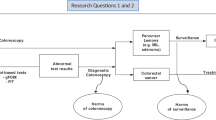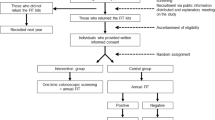Abstract
PURPOSE: Colorectal cancer is a major cause of death worldwide. To reduce the incidence and mortality from rectal cancer, an individual quantitative risk-assessment model (hereafter referred to as the Attributive Degree Value) and reverse passive hemagglutination fecal occult blood test were used in a randomized, controlled, population-based trial that was conducted in Jiashan County, People’s Republic of China. METHODS: All residents of Jiashan County aged 30 years or older were enrolled in the study, and 21 townships in the county were randomized to either a screening (n = 10 townships) or control (n = 11 townships) group. Participants in the screened group submitted a one-article-per-slide stool sample and completed a structured risk-assessment questionnaire from which their attributive degree value was computed. According to study protocol, 4,299 participants were defined as high risk and underwent diagnostic evaluation with 60-cm flexible sigmoidoscopy and, in some cases, an additional screening with colonoscopy. RESULTS: From 1989 to 1996, cumulative mortality from colon cancer was 90 (95 percent confidence interval, 83–97) per 100,000 in the screened group and 83 (95 percent confidence interval, 76–90) per 100,000 in the control group (log-rank = 1.49, P = 0.222). Mortality from rectal cancer during this time was 110 (95 percent confidence interval, 102–118) per 100,000 in the screened group, which differed significantly from the control group mortality rate of 161 (95 percent confidence interval, 152–170) per 100,000 (log-rank P = 0.003). CONCLUSION: Mass screening with a reverse passive hemagglutination fecal occult blood test along with an individual attributive degree value score was effective in reducing mortality from rectal cancer but not in reducing mortality from colon cancer or the incidence of colorectal cancer.
Similar content being viewed by others
References
RT Greenlee T Murray S Bolden PA Wingo (2000) ArticleTitleCancer statistics, 2000 CA Cancer J Clin 50 7–33
LD Li FZ Lu SW Zhang et al. (1997) ArticleTitleAnalyses of variation trend and short term detection of Chinese malignant tumor mortality during twenty years Chin J Oncol 19 3–9
BT Ji SS Devesa WH Chow F Jim YT Gao (1998) ArticleTitleColorectal cancer incidence trends by subsite in urban Shanghai, 1972–1994 Cancer Epidemiol Biomarkers Prev 7 661–666
J Huang JM Wu G Yang SZ Zhang H Yu (1996) ArticleTitleMultiple variant COX regression analysis of pathological feature for progeny of colorectal cancer J Chin Oncol Clin 23 156–162
JS Mandel TR Church F Ederer et al. (1999) ArticleTitleColorectal cancer mortality J Natl Cancer Inst 91 434–437
JD Hardcastle JO Chamberlain MH Robison et al. (1996) ArticleTitleRandomised controlled trial of faecal-occult-blood screening for colorectal cancer Lancet 348 1472–1477
O Kronborg C Fenger J Olsen et al. (1996) ArticleTitleRandomized study of screening for colorectal cancer with faecal-occult-blood test Lancet 348 1467–1471
JM Jessup HR Menck A Fremgen et al. (1997) ArticleTitleDiagnosing colorectal carcinoma CA Cancer J Clin 47 70–92
H Yu S Zheng XH Cai et al. (1990) ArticleTitleEvaluation of RPHA fecal occult blood test in screening for colorectal cancer J Chin Oncol 12 108–110
S Zheng JM Wu Hai Yu et al. (1991) ArticleTitleThe screening model for early diagnosis of colorectal cancer in general population Chin Med J 71 381–385
AS Whittemore AH Wu-williams M Lee et al. (1990) ArticleTitleDiet, physical activity and colorectal cancer among Chinese in North America and China J Natl Cancer Inst 82 915–926
WX Zhu JJ Lin (1988) ArticleTitleReverse passive hemagglutination for detection of fecal occult blood Chin Med J 101 519–522
K Chen (1993) ArticleTitleAn applied study on the method of multi-factorial quantitative-risk assessment (MFQRA) for mass screening of colorectal cancer [in Chinese] Chung Hua Chung Liu Tsa Chih 15 37–40
JS Mandel JH Bond TR Church et al. (1993) ArticleTitleReducing mortality from colorectal cancer by screening for fecal occult blood N Engl J Med 328 1365–1371
CA Lang DF Ransohoff (1994) ArticleTitleFecal occult blood screening for colorectal cancer. Is mortality reduced by chance selection for screening colonoscopy? JAMA 271 1011–1013
RL Hope G Chu AH Hope RG Newcombe PE Gillespie SJ Williams (1996) ArticleTitleComparison of three faecal occult blood tests in the detection of colorectal neoplasia Gut 39 722–725
Author information
Authors and Affiliations
About this article
Cite this article
Zheng, S., Chen, K., Liu, X. et al. Cluster Randomization Trial of Sequence Mass Screening for Colorectal Cancer. Dis Colon Rectum 46, 51–58 (2003). https://doi.org/10.1007/s10350-004-6496-2
Issue Date:
DOI: https://doi.org/10.1007/s10350-004-6496-2




